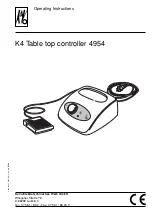
27/04/04 ©
Söring
Users manual RF-units
1
not valid for MBC600
-19-
4.5. Dangers from inflammable and explosive media.
In RF surgery development of sparks at the active electrodes cannot be avoided. If
inflammable or explosive agents for e.g. anesthesia, skin cleaning, degreasing and disinfection
or endogenous gases e.g. within the gastrointestinal tract are present, RF surgery must not be
applied because of fire and explosion hazard.
-
For application of RF surgery all media necessary for the operation should therefore
neither be inflammable nor explosive, at least these media should be completely
evaporated and removed from the area of sparks (wait at least 10 seconds) before
switching on the RF surgery equipment.
-
There is a risk of inflammable fluids gathering underneath the patient or in cavities of
the body (e.g. the navel). These fluids should be absorbed and removed.
-
In order to avoid endogen gases the patient should be fed with an appropriate diet prior
to the operation. Furthermore the gastro-intestinal tract must be opened without RF
surgery.
-
Explosive anesthetic agents (especially open anesthesia procedures) must not be used
in electro-surgical operation on the head, respiratory ducts, lungs and stomach.
-
The units are not certified under AP classification! If combustible anesthetics, laughing
gas or oxygen are used in the thorax or head, these substances should be directly
sucked away or a unit of the AP class should be used instead.
4.6 Instructions for special applications
-
If the operation with RF surgery equipment is extended over different parts of the body
the position of the patient electrode must be optimal for all areas of operation.
-
For RF surgery equipment with two monopolar connections, problems will arise, when
two electro-surgical operations are performed simultaneously on the patient. The
surgeon should therefore decide whether it is really necessary to perform these
operations simultaneously, or whether they can be made one after the other.
-
The simultaneous use of two RF surgery units on a patient is not allowed.
-
When operations on small parts of the body are performed (e.g. vessels or hollow
organs), the use of bipolar technique could be advisable in order to avoid unwanted
coagulation at other parts.
-
The simultaneous application of electro-surgical instruments and metal clips on hollow
organs with small cross-sectional areas is dangerous and may cause coagulation
necrosis.
-
Directly grounded monitoring equipment, e.g. pulse monitoring clips, should not be used
as burns may arise.
-
When RF surgery is applied to persons with implanted cardiac pacemakers or
electrodes, irreparable damage to the pacemaker or disturbance of the pacemaker
function together with ventricular flutter may happen. In case of doubt, the cardio-
logical department should be consulted.
-
The patient is also endangered when a cardiac catheter is present during an electro-
surgical operation (micro-shock), because if the connection of the patient electrode to
the RF equipment is interrupted, part of the current may flow directly through the heart.
-
Instruments/electrodes not in use must be kept a far distance from the patient!
















































